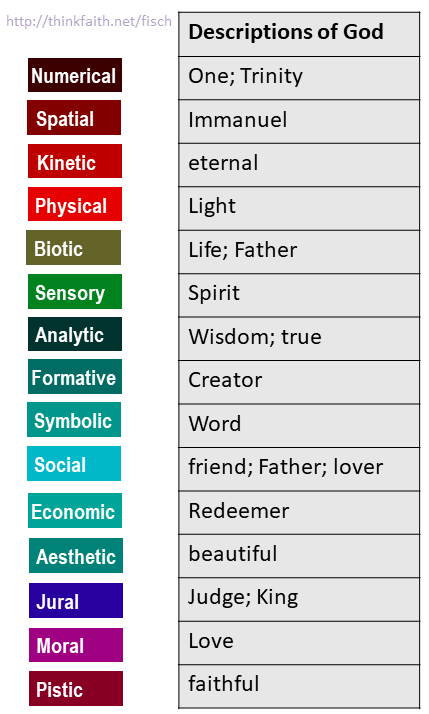The KLC Junior Scholars’ Reading Group looking at Herman Dooyeweerd’s book In the Twilight of Western Thought has begun, and our first session proved fascinating and thought-provoking for me. Besides Mike’s monthly posts going through each chapter ahead of our discussing it, we’ll also have some reflections from participants. I want to set the ball rolling today with some thoughts on Dooyeweerd’s fifteen ‘modalities’: the modal aspects for which his philosophy is best known.
One member of our group today recounted how, early in his academic career, he realised that writing computer programs involved representing various aspects of the world, and identified five ‘aspects of knowledge’: numbers, entities with properties, space, change and text. He asked a philosopher for the standard list of such aspects, only to be told that there weren’t any: what he was intuiting was merely socially constructed. He went away dissatisfied – but was gratified when, some years later, he discovered Dooyeweerd’s framework.
There is plenty more work to be done around modal aspects to challenge the prevailing view of mainstream philosophers. But reading Dooyeweerd again today reminds me just how rich and pregnant his framework is. The aspects are the ‘hows’ of reality: the basic ways (modes) in which things function. They are also supposed to be ultimate, foundational concepts that can’t be reduced to anything simpler: rather like primary colours – and indeed Dooyeweerd repeatedly uses the metaphor of the refraction of light into a spectrum. This means the aspects cannot be defined; instead, says Dooyeweerd, “every aspect can reveal its proper modal meaning only in [their] total coherence” [1]. He goes on to describe the connection of each aspect to every other aspect as a “moment”, and gives some examples of concepts that arise at these connection points: for example, “emotion” where the sensitive aspect reaches back to the kinetic, and “aesthetic feeling” where it reaches forward to the aesthetic. I have tried to evoke this interdependency in the diagram below.

Dooyeweerd’s language is thick and suggestive – utterly obscure, it seems, to your average analytical philosopher! He reads more like a Continental philosopher, yet his intricate, comprehensive systematics are not typical of that tradition either. But I want to dwell on the thought that there might really be something like 15 fundamental modes of possible functioning at the root of our experience. And here I want to think about this theologically: from the perspective of the Bible.
Of course, the idea of modal aspects doesn’t come directly from the pages of Scripture. Like the group member I mentioned earlier, various thinkers [2] have come to an idea of fundamental aspects, and surely, by God’s grace, all kinds of people can discern truths about the created order. But we might also think about the many metaphors by which God is described in the Scriptures. The first that will come to mind for many of us is: God is love (1 John 4:16). Other prominent terms in John’s writings are Word, life, light and Spirit. Elsewhere we encounter Wisdom, and we also find anthropomorphic roles: especially creator, lord, ruler, judge, redeemer, father (and son), king; and we infer the Trinity (3 in 1). And this sample actually represents most of Dooyeweerd’s aspects – especially if we add in “eternal”, “true”, “beautiful”, “faithful”, and Immanuel (God with us):

I wonder what you make of this. What prominent conceptions of God have I missed? I’m not arguing that Dooyeweerd’s aspects can be inferred from the Bible; simply that they do seem to give good coverage of the most important concepts by which God is revealed to us. The most direct revelation, of course, is the man Jesus Christ – and humans, Dooyeweerd insists, function actively in all aspects.
Let me finish by pointing out one way in which this Reformational approach diverges from classical philosophical theology. Many theologians – most influentially Aquinas – argue that a certain set of ‘perfections’ reside in God, or even constitute God. Thus, for example, perfect goodness, eternity, life, love and justice may be held to be divine: not metaphors or pointers to God, but aspects of Godself. Reformationals sometimes call this view ‘theontology’ and argue [3] that it makes humans and other creatures, insofar as we partake in these characteristics, even imperfectly, to be partly divine. Instead, we see the whole richness of the created order as reflecting the many-sided wisdom of God (Ephesians 3:10): as the language of God’s revelation to us. Oh – and it’s not too late to join our reading group!
_____________________________
[1] Dooyeweerd, H. (2012) In the Twilight of Western Thought (Paideia Press), p.9
[2] In ancient times, Aristotle outlined ten categories; recently Ken Wilber’s ‘Integral Theory’ uses multiple levels. For many others, see http://dooy.info/compare.asp.html
[3] See Clouser, R.A. (2005) The Myth of Religious Neutrality, p204 ff.
- Wise Men Still Seek Him - January 6, 2026
- Philosophy in full colour - October 21, 2025
- Flowers not flavours in AI: How large language models resonate with the beauty of creation - May 19, 2025



3 Comments
Steve Bishop · January 31, 2022 at 3:18 pm
Thanks for this Richard – love the diagrams.
I was intrigued by the modal aspects and the metaphors of God. I’m not sure how “eternal” fits with the kinetic aspect. Could you elaborate please?
Richard Gunton · January 31, 2022 at 9:42 pm
Thanks for that question, Steve. I was thinking that God’s eternity is about His constancy through all time, and how the kinetic aspect is sometimes said to be about change as well as about motion through space. What do you think? Maybe that one was a slightly contrived fit? Now I think of it, “the Way” is more of a kinetic metaphor. Also, I would change “Wisdom” and “true” (under Analytic) simply to “Truth” (thinking again of John 14:6).
Mark Roques · January 31, 2022 at 7:31 pm
Excellent article Richard. A very insightful and accessible introduction to the modal aspect theory.
Comments are closed.